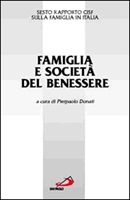SIXTH REPORT
Family and the Well-being Society. How to Build a Family Friendly Society, 1999
 The crises of the systems of social security in many developed countries has often asked for radical operations of change, as well as for re-definition of the concept of “well-being”.
The crises of the systems of social security in many developed countries has often asked for radical operations of change, as well as for re-definition of the concept of “well-being”.
Advanced welfare state systems intended to promote a citizenship in which the condition of well- being was considered as uneliminable right of every person. The Report intercepts this remark on well- being using an original point of view, “external” as compared to the discussion between public and private, between state and free market interventions, between individual freedom and common good. The Report highlightens how any remark on personal and collective well-being can not leave aside the family dimension.
The analyses here proposed, underlines a fundamental distinction between individual and family well-being. The social interventions intended to support the well-being of persons and families often risk to accentuate the separation between the different spheres of life and to dispossess family systems from their relational capabilities instead of promoting the quality and the family well-being.
In this way, the welfare state lost exactly that supportive subject, the family, which it had intended to protect, and on which base it could pursuing large part of its goals.
Even today, the welfare state does not see how large part of its failures derives exactly of having eroded the basis of family solidarity.
The actual challenge concerns thus the social as well as the family sphere: society is asked to “ know how to watch “ the family, while respecting the its laws, internal dynamics and values.
The families are asked to know how to open towards the external context, to know how to enlarge its relational network, how to build an interface with the external sphere, assuming its own responsibility of participation at the res publica, and of the generation of common good.
Family and well-being: new horizons beyond the culture of dependency
Pierpaolo Donati
Family and society: paradoxes and counter-paradoxes, myths and anti-myths
Pierpaolo Donati
The social stratification of families facing social policies
Paola Di Nicola
Psychological well-being. Quality of family ties and family transitions
Eugenia Scabini, Camillo Regaglia
Family and comunitarian dimensions of psychological distress. Which services for which well-being?
Corrado Pontalti, Franco Fasolo
Family well-being and family associations
Giovanna Rossi, Andrea M. Maccarini
Children education and school: the choise of families between cultural identities and social equity
Luisa Ribolzi
Family income and tax system
Luigi Campiglio
Family and social protection system
Carla Collicelli
Which well-being for the Italian family?
Pierpaolo Donati